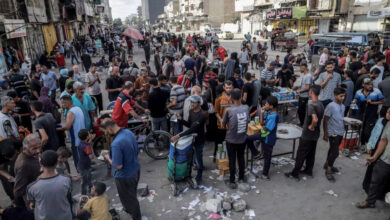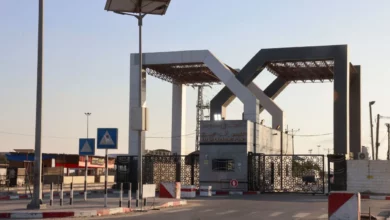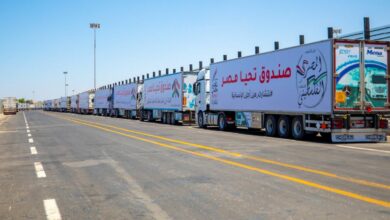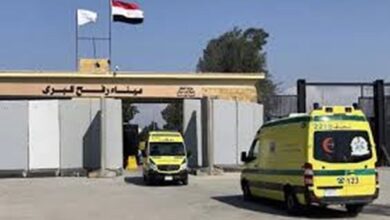North Sinai–Driving behind a truck filled with goats heading to the border town of Rafah in North Sinai, Hassan, a middle-aged Bedouin, pointed ahead and said, “This is smuggling for a good cause.”
Hassan himself has been involved in the active underground trade movement between Rafah and Gaza, a movement that flourished since the Egyptian-Israeli blockade that began in 2007. “The goats will go to Gaza and benefit both the Palestinians there and us here. But that other type of smuggling, I hate it and I campaign against it.”
The “other type” of smuggling is that of African refugees and migrants who cross the Egyptian border to reach Israel. Egypt’s shares a 238km long border with Israel. Along that distance, a thriving human trafficking business is actively breaching the Jewish State’s vaunted border security. Hundreds of migrants, refugees and asylum seekers make this journey each week. Estimates from Israeli NGOs say at least 13,000 of them have crossed since 2006.
“A Sudanese man approached me and said, ‘Your work is really bad here. You work a lot to no avail. I can help you go to Egypt and work in a company there. And then, from there, you can cross to Israel. It’s good work. God will help you,’” said Youssef, a 28-year-old Ethiopian. He sat on the back of a pick-up truck parked under a tree in a vast desert, some five kilometers from the Israeli border. He spoke with Al-Masry-Al-Youm late at night for his smuggler could not move around with him until it was dark.
Youssef left his hometown in Ethiopia two years ago in search of a better life in Port Sudan, to the east of Khartoum, where he worked at a hotel. But the Sudanese man’s offer sounded promising to him. “I was convinced and I decided to go. I was transferred along with others to Kassala [a city in eastern Sudan]. From there, a pick-up truck drove us along the old Halfa road to reach Sinai. We spent five days on the road. There were 15 of us. The truck broke down on the road and we ran out of water. Five people left the truck and stayed behind in search of water. I stayed in the truck, and we continued to Sinai.”
Upon his arrival, there was no company for Youssef and his fellows to work in as promised. “We’ve been waiting here for three months. We don’t have money and that’s why we’re not crossing. They told us we can come for free, but once we arrived here, they asked us for money,” he said. His smugglers asked him for US$3500 to cross and have been violently pressuring him to send the money. “They hung us from trees under the sun with metal chains and gave us plastic bags to urinate. We ate only two or three pieces of bread every day.”
He eventually escaped from his captors and was found wandering in the desert by other smugglers, who housed and fed him. He’s grateful for their hospitality, especially as he was penniless, but unsure whether they will agree to help him cross the border for free.
Ali, 16, is another Ethiopian who had been living in Sudan. “I used to deliver firewood on donkey carts. After my father’s death, I became responsible for my mother and my two brothers. A smuggler came up to me one day and told me that given my bad situation, I can go somewhere, work for four or five months and make enough money to come back and open a grocery shop.” Like Youssef, Ali was given a free ride to Sinai. “I told him (the smuggler) that I would ask my mother; if she agreed, I would come along. I didn’t tell my mother. The following day, I met him in the market with a group of people and a car. They were ready to leave. He asked me, ‘are you ready to come with us?’ I told him, ‘now?’ He said ‘yes, now.’ The devil played with my head and I went into the car with them.” In Sinai, Ali made the same discovery as Youssef: there was no job waiting for him there and he had to pay his smuggler $3500 to enter Israel. He said he was beaten up on a daily basis. “If I had $1000, I would not have thought of leaving Sudan,” he said, with his eyes fixed on the nearby border behind which the distant city lights of the Israeli city of Beershebaa shine. “I want to go there. It’s better than here. I am not afraid to go.”
This type of smuggling across Egyptian and Israeli territories is a large-scale operation involving lots of money.Under international law, it can be defined as human trafficking since it includes an element of deception. Hassan, who despises these type of smugglers, refers to them as al-nakhasseen: slave merchants. “These are people who buy and sell fellow human beings,” he said.
“I don’t feel I am doing anything wrong. I hurt no one. I take money from people and in return I help them cross into Israel,” said a 21-year-old smuggler of migrants and refugees, whose pseudonym is Walid. Walid’s work is less complicated than that of others. He has an agent in Cairo who recruits refugees and migrants already living in Egypt and interested in going to Israel. When they reach the Salaam Bridge that crosses over the Suez canal, he dispatches trucks to transfer the migrants to their point of departure, a patch of desert land some 10 kilometers south of Rafah.
In a small mud-brick house that Walid has built to host his clients, mattresses are placed on the floor next to each other in anticipation for the next group, which are due to arrive early the next morning. “About six people cross at a time. They usually arrive in the morning and leave by sunset. I don’t confiscate their passports or anything. When it’s time to cross, I make sure the road is clear. We usually pick the part of the border that falls between two soldiers’ stations. I send them with one of my men. He cuts a small part of the wire with a knife and asks them to cross silently. The whole thing takes about one minute,” he said, continuously pointing at the border lying four kilometers away. According to Walid, this type of smuggling costs the migrant US$300, half of which goes to the drivers and half to him. With three trips per week on average, he admitted that he makes a decent income.
“I don’t like bigger operations. They are more complicated and involve violence. Success is not guaranteed since many Africans who are brought to Sinai don’t have money to pay the smugglers. Our job is quicker and easier,” Walid said. He foresees quitting human trafficking one day, but not smuggling altogether. “I can’t do anything about it. If there’s a future for us, I can get a safer and more consistent job. But there’s no future.” Though he controls an established network of illegal transnational movement, Walid says he can’t move freely outside the confines of his village, for fear of being targeted by Egyptian security forces. The latter have been active in arresting hundreds of Bedouins from North Sinai on smuggling-related allegations.
As far as the border is concerned, Egyptian guards routinely shoot at migrants and refugees who are spotted trying to cross, killing several in the past year. General Muhammad Shousha, governor of North Sinai, defended the practice.
“Firing at them is only normal,” Shousha told Al-Masry Al-Youm. “When an infiltrator is spotted, he has to be fired at. If the soldier asks the infiltrator to stop, he normally won’t obey. That’s why the authorities must use force. Migrants are not randomly shot at. If the infiltrator doesn’t realize that he is not allowed to cross, the situation will be chaotic.”
According to Shousha, there is no alternative to the use of such force. “You can’t protect your borders 100 percent against smuggling. You protect it against major offenses, but you’re not going to stick soldiers next to each other. It’s particularly difficult in our case because it’s a mountainous area. A migrant can cross next to you and you’ll simply miss him.”
International and local rights groups have been critical of Egypt’s approach. The New York-based Human Rights Watch published a 90-page report in November 2008 on risks to refugees, migrants and asylum-seekers in Egypt and Israel. The report cited border shootings, forced deportations, detention, and military trials as major violations of human rights law by Egypt. According to the report, Egyptian border guards have killed at least 33 African migrants and refugees and wounded dozens who have attempted to cross.
The leftist Tagammu Party office in North Sinai has been equally active in documenting irregular border activities. According to Ashraf el-Hefni, the secretary general of the office, there’s a bigger aim behind this mobility and its tacit approval by both Egypt and Israel, which according to him, are still not seriously curbing the flow of migrants. “A huge number of people are being smuggled. It’s like a population being deported. We hear of at least 200 people being smuggled on a daily basis. In a year, this amounts to a huge number. This has to be related to Israel’s quest for judaization. Part of this quest is to expel Arabs and to compensate the labor gap with African workers.”
Hassan travels nearby houses to convince smugglers to refrain from their activities, appealing to their sense of patriotism. “We are helping Israel. These migrants will go, take away Arabs’ jobs, work in agriculture and construction and it will all contribute to Israel’s plans.”
Back in the desert, Ali had no idea what his future held. “I called my mother to tell her that I’m alive. She asked me to come back. I told her if I manage to cross and find a job I will stay. If not, I will try to come back. I await my fate.”




